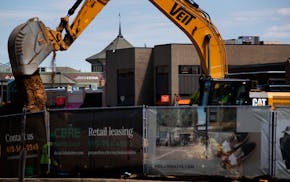The expanded role of primary health care clinics in the age of the Affordable Care Act is driving a healthy uptick in medical real estate as providers seek to fill gaps in the Twin Cities' medical map.
A push by providers to connect with patients in a "neighborhood retail" way is being driven both by competitive necessities and reforms under the Affordable Care Act that aim to reward primary care providers for keeping overall health care costs down.
"Primary care" means medical services delivered by physicians, nurse practitioners and physician assistants in such fields as family medicine, internal medicine and general pediatrics. Such basic care-giving is also seen by reformers as a key in lowering overall costs. Research shows patients paired with primary care physicians report lower illness rates, use emergency rooms less frequently and are hospitalized less often.
But the key for providers under the new primary care emphasis is "access," meaning more neighborhood/retail-style locations and higher public visibility, all aimed at creating long-term patient relationships.
"We have experienced increased interest and activity on the medical development front, driven largely by primary care," said Michael Sharp, principal of the medical real estate firm the Davis Group. "Our sense is that health care organizations are responding to both competitive pressures and reimbursement changes (under the Affordable Care Act) to create access points that can offer a broad range of services more proximate to their patient base."
As examples, he cited this year's move of Northwest Family Physicians to the new Crystal Medical Center on Bottineau Boulevard and decisions by Emergency Physicians Professional Association and Aspen Medical Group to anchor a new medical building in Vadnais Heights.
The mantra of access in primary care is also uppermost with HealthPartners, which is so busy raising its profile through new and expanded clinics, it's had to delay construction of a 13,000-square-foot addition to its Woodbury clinic.
"Just because of the sheer number of other things we're working on, we've had to put the Woodbury expansion off for a bit," said Bob VanWhy, HealthPartners' senior vice president of primary care. "We have several projects under way that vary in size but collectively are a pretty big drain on the resources we have to facilitate and coordinate all that."
HealthPartners -- awaiting government approvals for a proposed merger with Park Nicollet Health Services -- last month opened its new Nokomis Clinic on Chicago Avenue in Minneapolis.
In that project, Kraus-Anderson Construction performed an 8,000-square-foot renovation of a former community clinic space, including a complete demolition and build-out, to provide 12 exam rooms, radiology and lab areas.
In many ways, it's an example of filling in the gaps in the Twin Cities' medical real estate market: a primary care clinic from a large health care provider in an underserved area.
It also features the first urgent care facility in the Minneapolis neighborhood around the bustling Chicago Avenue-E. 48th Street intersection, VanWhy noted.
"When you drive around there, there's not much other health care that's close by," he said. "Our emphasis with a lot of our new locations is to site them in communities that look like they don't have the same level of access to care as others."
Also on the plate for HealthPartners: the ongoing construction of a new, two-story, 60,000-square-foot clinic in Anoka to be completed in July, another 8,000-square-foot clinic opening soon in St. Paul's Highland Park neighborhood and a collaborate effort with Children's Hospitals and Clinics in Hugo.
Don Jacobson is a St. Paul-based freelance writer.

Shop the curbs for free on 'Trash to Treasure Day' in White Bear Lake

Lacrosse lists: 21 top players and the school that's No. 1 for boys and girls

Will 'shotgun only' zone for deer in southern Minnesota be abolished?
One killed in head-on crash in Coon Rapids

